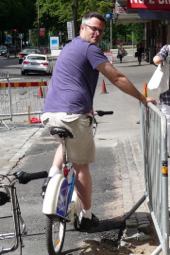
track in Stockholm, wants Portland to
compare itself to Europe’s best
biking cities.
(Photo: Tom Miller)
At a press conference today, Mayor-Elect Sam Adams announced major changes to how Portland will do business under his administration.
Along with new budget guidelines and new bureau assignments for City Commissioners, he also unveiled structural reforms — like a consolidation of the Bureau of Planning and the Office of Sustainable Development into the Bureau of Sustainable Planning & Development.
The plan was detailed in an eight-page memo to “All Portlanders” that was titled, “Improving ‘The City that Works'”. (You can read the full text here.)
Amid the changes listed in the document are a few lines that indicate Adams’ ongoing desire to set Portland’s sights on Europe when it comes to bike-friendliness.
Under the heading, “Service Efforts and Accomplishments Reports”, are the words (emphasis mine):
We have asked the auditor to augment the current list of comparator cities in the SEA Report to include “best in class” cities from around the globe. This will ensure we know how well Portland performs against not only similarly-situated cities but also cities with inspiring characteristics, e.g. the share of transportation trips made by bicycle in Copenhagen, Amsterdam, Stockholm, Vancouver, BC, etc.
The SEA is an annual report by the City’s Audit Services Division that has been compiled for nearly 20 years. It rates the City’s performance on a variety of services from fire safety to water quality. (I reported on the transportation-related findings in the most recent SEA report).
What Adams has done here, is to formalize within the City a comparison of Portland to the best bike cities in the world.
The Audit Services Division has long used what they call “comparison cities” to use as benchmarks for Portland. I asked Audit Services Public Information Officer Robert Cowan to give us a bit of context for how they’re used.
“The comparison cities are used in our annual SEA report. They allow us to see how we stack up on very specific measures to other cities,” Cowan said.
Cowan says adding in the new comparison cities as per Adams’ request is still being worked out, but he expects it will happen.
This may seem like a small thing, but being able to compare Portland’s bike mode split to the truly world-class biking cities will be a major eye-opener to residents and policymakers who aren’t as familiar with the comparisons as us bike geeks.
Having the City Auditor present those comparisons in an official report gives them a formality that is much different than rhetoric from politicians or fist-pumping from advocates.
This move is just the latest example of the impact that European cities are having on Portland’s transportation planners. Adams, his staffers, city traffic engineeers, and many local bike planners have recently been to Copenhagen, Amsterdam, etc… and with the title of “Best American Bike City” already wrapped up, their goals are increasingly focused on Europe.

